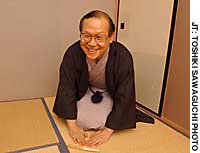|
|
|
The Japan Times
2002.10.13 Original text
|
|
WEEKEND WISDOM
Taikomochi beats drum on virtues
of lavish spending
|
|
|
By TAIGA URANAKA Staff
writer
Photo:TOSHIKI SAWAGUCHI
Shozo Arai, better
known as Taikomochi Arai, demonstrates the
trademark wide-smile greeting he uses to
welcome guests to traditional Japanese
saloon parties.
|

|
|
|
Despite the worsening economic gloom, clients of
traditional Japanese saloons have sustained their
spending spree, literally throwing away hundreds of
thousands of yen on the nightly extravaganzas.
|
|
"There will always be rich people in this
world," observes Shozo Arai, 56, one of the few
remaining "taikomochi," or "drum holders," in
Japan.
Taikomochi are the male counterparts of geisha.
Since the early Edo period, they have entertained
patrons with comic performances and lewd stories at
saloons in the traditional adult entertainment
quarters of Tokyo and Kyoto.
|
|
One of Arai's frequent patrons, asked why he
spends 1 million yen on each of his visits, replied
that spending more would be possible -- but
physically draining.
Sheltered from scandal-mongers in a secluded world,
where nothing goes beyond the paper screens and
wooden walls of the saloons, Arai's high-powered
clientele indulge in this rather exorbitant
money-throwing game.
Clutching wads of 10,000 yen bills, some guests
toss them toward Arai and geisha at the slightest
excuse.
"These people don't have time to spend the money,"
Arai explained. "And they cannot have fun unless
they spend all the money they decide to use for the
night."
As outrageous as it may appear, there is an
unspoken code of conduct regarding the
money-throwing ritual. During the heyday of the
bubble economy, there was a nouveau riche client
who used to tear up 10,000 yen bills to make
change. "It's obscene to treat money like that,"
Arai said, pondering what might have become of the
man since the boom turned into bust.
|
|
Arai's first encounter with a traditional saloon
party was in junior high school, when his uncle
took him to Kyoto's Gion entertainment
district.
The dream-like world unfolding within the
tatami-lined space, complete with beautiful geisha
and ethereal trappings, enthralled the barber's son
from Fukui Prefecture.
"I just fell in love with that world, but, of
course, I could not afford to visit such places,"
he said. "So, I decided to become a taikomochi so I
could always have fun with geisha."
It wasn't until he was in his 40s, however, that he
was able to win the trust of his patrons and
finally make a living in his chosen profession, he
said.
|
|
A smooth talker who loudly professes his love
for money and women, Arai is not merely a flatterer
who relies on dirty jokes, an image conjured with
the modern use of the word taikomochi.
|
|
At the whim of clients, he finds himself playing
the fool at one moment and tested on his knowledge
of culture, history and current issues the
next.
|
|
"My patrons often ask my opinion on business
issues," he said. "I just tell them what I honestly
think, although I don't know if it really matters,
actually."
|
|
And it is not only corporate bosses who seek his
advice.
Nowadays, he is often invited to lecture young
business owners, who want to tap the wisdom of
someone who has closely observed the rise and fall
of money-makers during three decades of
professional service.
On such occasions, Arai's advice is simple -- use
money on nightly extravaganzas, like his tycoon
patrons. "You can afford to do that if you stop
using money in a stingy fashion," he says.
But contrary to what his remarks may imply, Arai is
not preaching waste. Citing the virtues of making,
saving and spending money, Arai said people
nowadays seem less concerned with how to spend
money to help enrich their lives.
|
|
"During periods of economic growth, you should
just do what others do because you can just ride
the upward wave," he said. "But in today's economic
slump, you should do things differently from
others, otherwise, you will go down with them."
In recreation, too, spending money in dribs and
drabs, as others do, is no help at all, Arai
claims.
"Save up for a year and spend all the money in one
night in a lavish way. That way, spending money for
fun will come to have meaning in your life."
|
|
The Japan Times: Oct. 13, 2002
(C) All rights reserved
|
|
|
![]()
![]() ejt0210-houkan@mitene.or.jp
ejt0210-houkan@mitene.or.jp